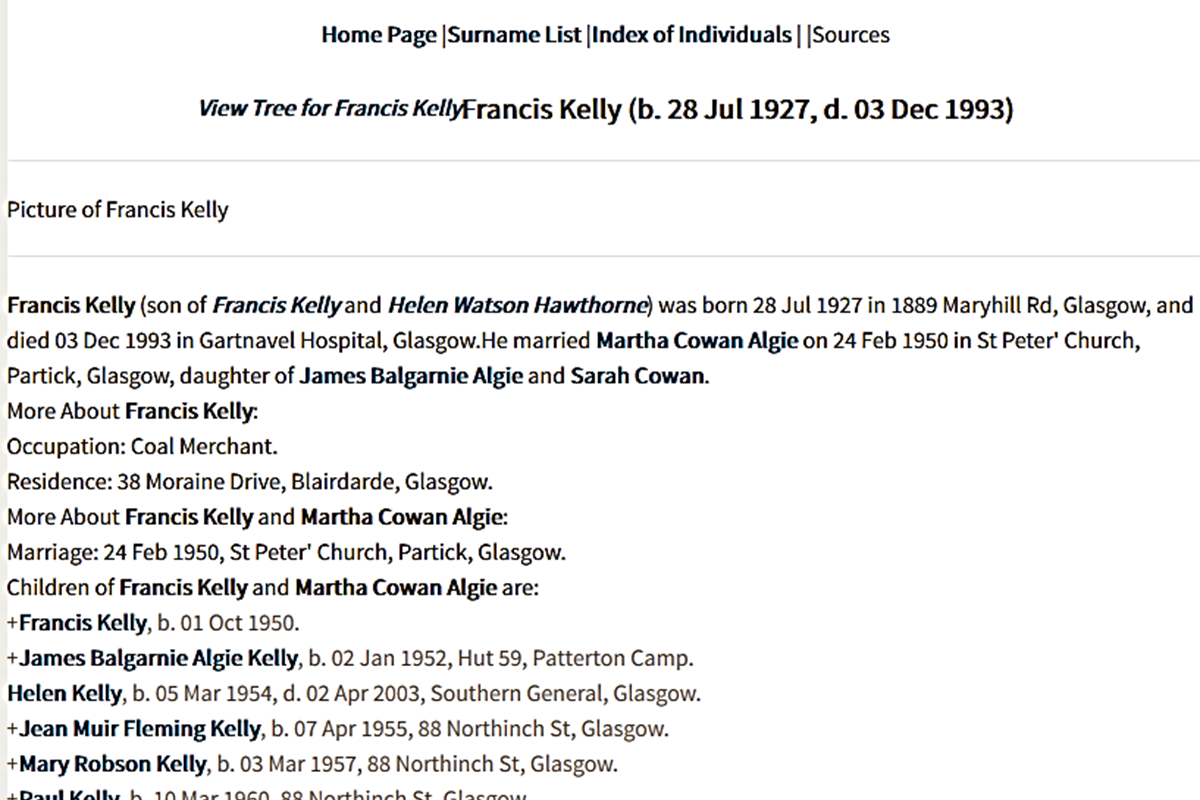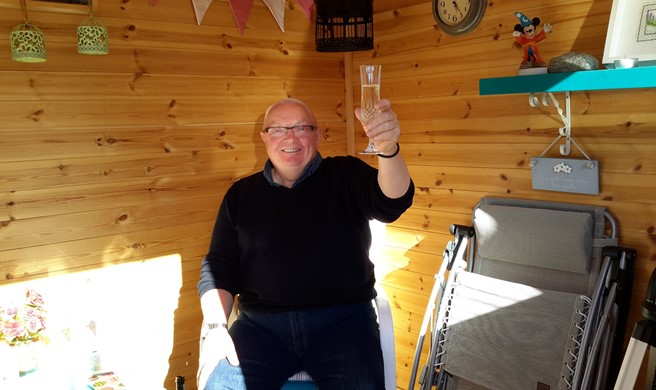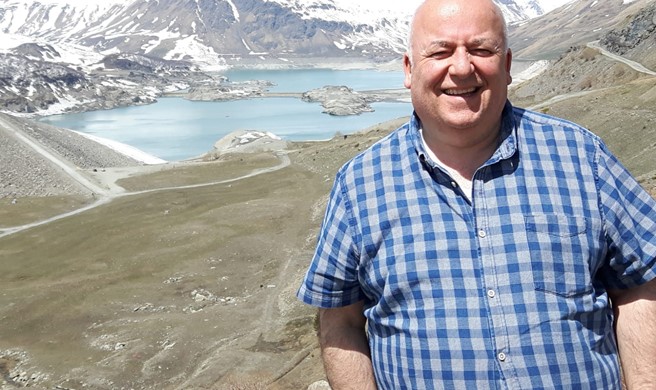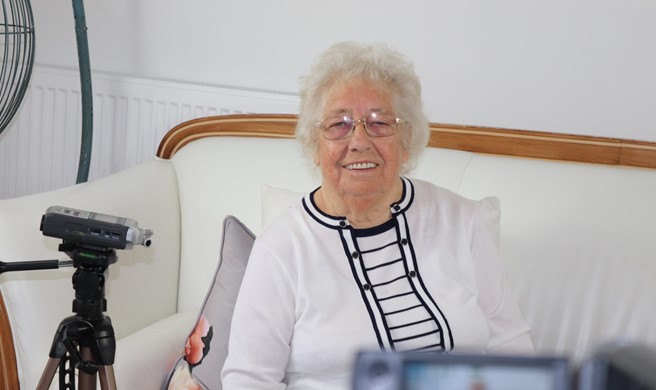Patterton’s Residential Camp Era Part 2
There is a general theme in our oral testimony of people taking pride in their homes and making small improvements to huts and the surrounding area. This was something which is documented as having happened in other camps throughout the UK. Here Robert Thomson remembers the work of his father, who was a monumental sculptor:
What a’ dae remember is…’coz you see it in the films, the round stove, and a chimney that went through the roof. That’s what like oor first hoose was. Oor first hut. As I say my father was a stone mason and a monumental sculptor. And he got a grate, as you call it, and built it into the side o’ oor hut. So that we had a fire on the side o’ oor hut. No in the middle o’ it…and he put a smaller chimney through the roof. And we had a grate. And that’s what we had. And ma’ uncle across the way, him and my da built one for him as well. So, we were toffs wi’ these fancy fires.
Robert Thomson
Raymond Barnes remembers his mother had curtains up in their hut:
No…she never really degraded it or anything - she made the most of it because, she always used to have the terylene curtains up in the windows and so forth, y’know. We tried to make the best of it…the best of what we had, and that was it.
The occupants may have used the gardens created by the POWs, as Raymond Barnes recalls that there were some flower beds still tended by some residents that dated from those days. Robert Thomson remembers some people growing vegetables. As it was just after the war and rationing was still going on, this would have provided a supplement to the residents’ diets.
Norma Wilson also spoke about people growing vegetables in the post-war camp; at least one of them might have been a former POW:
I’ve got a kind of cousin Jeanette. And she says she’s got memories. She said he was an ex-German prisoner and he seemed to have a piece of land adjoining Lambie’s [farm]. And he was growing vegetables on it, and I think he lived in one of the Nissen huts. She mentioned a name, but she couldn’t quite remember. But it was an anglicised name, it wasn’t a German name. But she said he was definitely a German. So, that must have been after the war. Late ‘40s, early ‘50s. Don’t know what happened to him in the end.
Captain Galbraith stated that the rents were being collected by the Department of Health Scotland. Robert Thomson remembers the rents for the different sizes of hut being discussed at the camp. He states that it was around six shillings for half a hut, and eight shillings for a whole hut. He was not sure if that was for a week or for a month’s rent. It is unclear who divided the huts.

We know of at least five babies that were born in Patterton Camp. We have also heard about children going from the camp to school in Carnwadric and Thornliebank, and being bussed as far as the Gorbals for their schooling. We have heard tell of parents working in different jobs and industries. The course of normal life seemed to have generally gone on for these people, despite their unusual dwellings.
We have not heard a great deal in terms of relations with the local population. Most of our respondents who lived outside the camp have little recall of this phase of its existence. Two of the respondents who do remember, seemed to be under the impression that the camp had Irish travellers in it at some stage. John Manson said that he recalls being told to stay away from the camp for that reason. He also states that it was not exclusively Irish travellers who lived at the camp. James Rodger knew about Irish travellers living there during this time. He remembers a man going in to pick a fight there every Saturday night. Robert Thomson recalls:
The men from Thornliebank, came up to the camp. And there was a fight that seemed to be between the men in the camp and the men in Thornliebank. What it was aboot, haven’t a clue. But I remember it actually happenin’…As a’ say, I was only whatever age… And there was a battle royal going on outside. Maybe other people will remember it. But that was only the once it ever happened.
Phil Wilson tells us that his mother was assaulted whilst pregnant with his younger sister, just outside the camp. Men from the camp scoured the area but could not find anyone. Thankfully there was no lasting damage to mother or baby. On a more positive note, Norma Wilson tells us about a relative from the area who used to visit a resident of the camp:
And she mentioned there was some old lady lived in one of the Nissen huts after the war and Jeanette used to visit her.
We have heard about people from the camp working on Patterton Farm, picking turnips, and of kids scrumping vegetables from there. Robert Thomson told us about getting paid with a toffee bar to go and collect papers from Patterton train station for Hutchison’s shop. He also told us about football matches against other camps that were being used as housing in the area.
There is a general feeling from our oral testimony that the children enjoyed the freedom of the countryside in the area around the camp. Phil Wilson sums this up below:
We kids used to run all over the camp with not a care, and the corn fields were our favourite place in the summer months. We would be up there for hours, only coming home when we were hungry for something to eat. According to my mother, I used to bring all my pals back to our hut for bread and jam, no biscuits in those days!
Both oral testimony and anecdotal evidence indicates that the Patterton camp was empty by 1957, and that this may be related to Glasgow Corporation finally putting ‘squatters’ on its housing list in 1956. However, it may be that one or two people lived there quietly until all the huts were eventually demolished a year or two later. Raymond Barnes’ and Robert Thomson’s families left Patterton in around 1955 to move to Pollokshaws and Priesthill, respectively. Robert Thomson would come back and stay over with friends still living in the camp until they, too, moved out. Phil Wilson’s family left in 1954 for the Wirral. Here, Phil sums up his thoughts about living in the camp:
All in all, I do not think Patterton Camp did our family any harm at all. We were certainly not squatters as some reports think! It was the circumstances of the time, just after the war, that required people to do what they could for their families.
Phil Wilson



